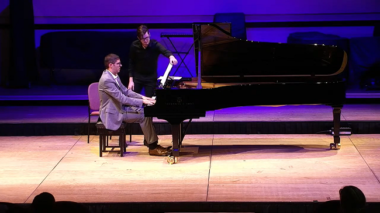 United Kingdom Vale of Glamorgan Festival [2] – Robin Green (piano): Cardiff University Concert Hall. 26.9.2022. (PCG)
United Kingdom Vale of Glamorgan Festival [2] – Robin Green (piano): Cardiff University Concert Hall. 26.9.2022. (PCG)

Adès – Darkness visible (1992)
Robert Fokkens – On Quietude and Dancing (2016, world premiere)
Adams – Phrygian Gates (1977)
The centrepiece of this enterprising Vale of Glamorgan Festival piano recital was the somewhat belated world premiere of Robert Fokkens’s substantial twenty-minute piece On Quietude and Dancing. Although written six years ago, it was only now receiving its first performance, under circumstances which were outlined in a preliminary interview between the composer and Charles Wilson.
The work consists of five movements. It begins and ends with two sections entitled Commentary, which contrast the soloist playing delicately inside the instrument, seamlessly interwoven with rhapsodic contemplations at the keyboard itself. There is also a brief and vigorous Précis which further explores the basis thematic material. The two principal sections are more extended. The first, Aria (it quotes briefly from Bach’s Goldberg Variations), is a rapt and still depiction of the quietude of the work’s title; it slowly expands from tentative beginnings to an impassioned climax and back again. I was reminded of a pool of water disturbed by the dropping of increasing ripples which only gradually subsided to their original pattern. By contrast, Tropes is a dance movement; it begins slowly and gradually accelerates into a more frenzied pace via a Morse-like insistent theme. Again the thematic material is slowly amassed, with superb playing from Robin Green – and his intrepid page-turner who had to contend in Précis with a page that really did not want to stay turned! The final section again had the pianist excavating inside the piano with pedal depressed against staccato attacks on the lower register. The resultant harmonics might have been close to inaudible in a larger space; but in the resonant acoustic of the hall here they worked perfectly.
The recital had opened with a performance of Thomas Adès’s brief seven-minute Darkness visible, something of a technical tour de force. It is a transcription of John Dowland’s song In darkness let me dwell with often surprisingly violent dislocation of pitch and dynamic. But – as the composer insists in the programme note – no notes actually added, although ‘some have been removed’. Thirty years ago, the piece was acclaimed as a brilliantly effective realisation of the mood of the Dowland song with its ‘walls of marble black’. Now that we have become accustomed to the music through the medium of recording, its bareness of texture is somehow unsatisfying. We can still admire the expertise of the writing, and the exploitation of piano technique, and yet the atmosphere has somehow evaporated over the years. The most telling moment in the performance came when, in the closing bars, the original Dowland music materialised quietly to provide a rapt conclusion which illustrated rather too clearly what had been missing before. This is of course a perennial danger in the use of pastiche and collage, a danger of which we are perhaps more conscious now than we were three decades ago.
But then John Adams’s Phrygian Gates is an even older score, and it still seems fresh even after we have become acquainted with the music over nearly half a century of recordings. The composer’s programme note is quite forbidding. It lays emphasis on the procedures he adopts in his modal writing and contrasts in a manner that could lead the unwary to suspect a highly intellectual argument; but his handling of his material is quite the opposite. What the listener is not prepared for in a live performance – as opposed to a recording – is the sheer physicality and virtuosity of the piano writing. The headlong torrent of ostinato rhythms hardly eases for a moment, except to launch into some new modal patterning which alternates between Phrygian and Lydian scales. But each time the mesmeric repetition threatens to reduce the hearer to a state of meditative contemplation, a new and unexpected twist in the pattern quickens the pulse once more.
The sheer stamina of Robin Green’s playing was astonishing. It was a wonder that his arms were not physically shaking with the effort at the end of the performance. And, although there might have been plentiful opportunity (and excuse) for wrong notes to slip by unnoticed, his accuracy appeared to be faultless. We know that Adams’s style has developed considerably since his earlier and more strictly minimalist days when he wrote Phrygian Gates, but the music has not dated and remains as enthralling as ever.
This was another exceptional concert in the course of this year’s Vale of Glamorgan Festival, whose enterprise – and policy of featuring only the work of living composers – remains a beacon of enthusiasm and enlightenment. I was struck yet again by the fact that the audience consisted of far more than the usual collection of professional musical practitioners, with a public audience delightedly prepared to experiment with, and enjoy, new music.
Paul Corfield Godfrey
